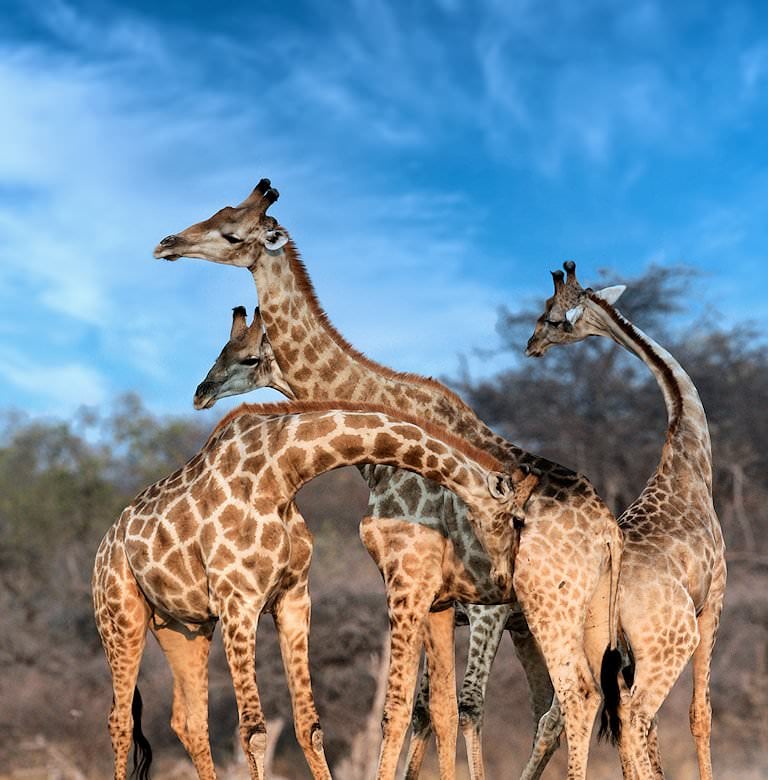14 Day Namibia Private Overland Tour
Help Me Plan- Home
- >
- African Safari
- >
- Namibia Packages
- >
- 14 Day Namibia Private Overland Tour
Summary
Over the course of two weeks, this privately guided overland journey links Windhoek, Fish River Canyon, Aus and Lüderitz, Sossusvlei, Swakopmund, Damaraland and Etosha National Park. Expect wide desert horizons, characterful coastal towns and memorable wildlife encounters at Namibia’s most iconic destinations.
- 1 Night Windhoek
- 1 Night Fish River Canyon
- 2 Nights Aus-Lüderitz
- 2 Nights Sossusvlei
- 2 Nights Swakopmund
- 1 Night Damaraland
- 4 Nights Etosha National Park

Namibia Private Tour Itinerary: 14 Day Namibia Private Overland Tour
This private overland journey is an in-depth, comprehensive exploration of Namibia's most dramatic desert and wildlife landscapes. Privately guided throughout by an experienced African Sky guide, the tour offers the luxury of a dedicated expert and a private vehicle to navigate the vast distances of Namibia.
- Riaan Viljoen -Day 1: Arrival / Windhoek

Highlights
- Warm welcome by your private African Sky guide.
- Introduction to Namibia’s capital, Windhoek.
- Relax and acclimatize in the Khomas Highland region.
Guests are met and welcomed in Johannesburg by their African Sky guide. After completing formalities, the party boards a regional flight to Windhoek in Namibia. On arrival, your guide will finalize vehicle arrangements, after which the party will travel to their overnight accommodations in the city.
The remainder of the day is spent at leisure in Namibia’s capital. Windhoek sits on the Khomas Highland plateau at around 1,650–1,700 m above sea level and serves as the country’s political and cultural hub, with a blend of African character and German colonial-era architecture in landmarks like Christuskirche and the Tintenpalast. This gentle introduction allows time to adjust to the altitude and get a sense of the country before heading into the wilderness.
Day 2: Windhoek / Fish River Canyon
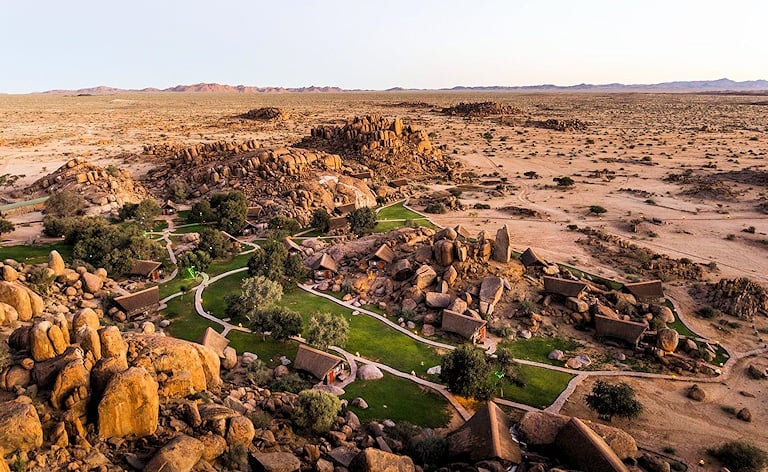
Highlights
- Scenic journey from highland landscapes into the Namib Desert.
- First viewpoints over Africa’s largest canyon.
- Spectacular sunset views at Hobas.
After breakfast, the tour departs Windhoek and travels south to the Fish River Canyon, Namibia's second-most popular tourist attraction. As we travel, the countryside morphs from wooded grassland into desert scenery. Not long after passing the rural town of Keetmanshoop, we say goodbye to paved roads and head out into the Namib Desert, finally arriving at our overnight accommodations around mid-afternoon. After check-in and some time allowed for relaxation, a visit is made to the Fish River Canyon near Hobas.
The canyon is the largest in Africa and one of the largest in the world, with a gigantic ravine almost 160 km long, up to 27 km wide and nearly 550 m deep in places. Sunsets from the Hobas viewpoints are spectacular as the sun sets due west over the canyon, lighting up the stony canyon walls with golden, orange and red hues. Today the river usually flows only intermittently, leaving a dry, stony landscape dotted with hardy drought-resistant plants adapted to the arid conditions.
Day 3: Fish River Canyon / Aus-Luderitz
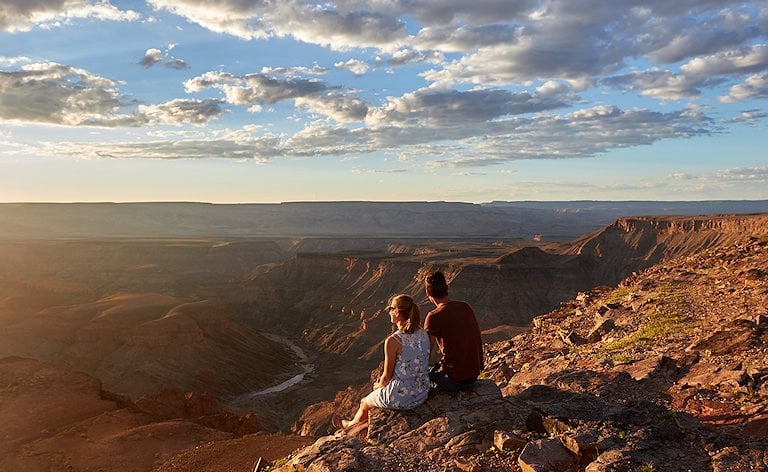
Highlights
- Transition from canyon country to vast gravel plains.
- Travel into the historic Sperrgebiet region.
- Guided sunset drive to see Namibia’s wild desert horses.
After a late breakfast, a quick stop – if required – is made again at the Fish River Canyon before traveling north to the national B4 road. Once we reach this paved road, we turn due west towards Namib-Naukluft Park and the Sperrgebiet, the restricted diamond area, where your overnight accommodations are conveniently located. The drive showcases the transition from canyon country to open gravel plains and distant mountains.
After some time relaxing in this surreal environment, guests enjoy a guided sunset drive into the desert near the lodge, where they may see the famous wild desert horses and the unique desert ecology at close quarters. These feral horses roam the Garub plains between Aus and Lüderitz and have adapted remarkably to the harsh Namib environment. As the sun sets over the southern Namib, the wide horizons, pastel colors and clear desert air create excellent photographic conditions and a memorable first night in this remote region.
Day 4: Aus-Lüderitz
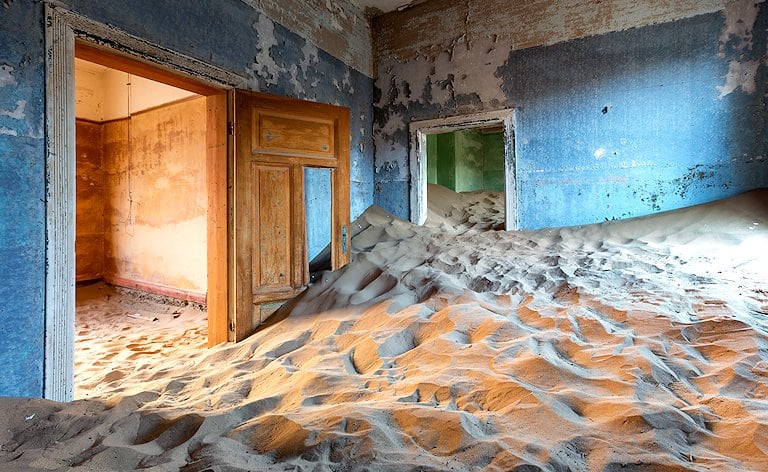
Highlights
- Exploration of the abandoned diamond town Kolmanskop.
- Discover coastal Lüderitz and its German-colonial architecture.
- Atlantic scenery shaped by strong Benguela winds.
The ‘ghost town’ of Kolmanskop is located about ten kilometers from the coast amongst a sea of rock and dune and was once a thriving mining settlement with opulent luxuries found in every prominent household, all imported at great expense from Europe. Near this settlement in 1908, a laborer found the first diamond, which led to the realization that the area was rich in these precious stones. The German colonial government quickly declared the area a prohibited or ‘Sperrgebiet’ and began exploiting its mineral wealth, creating a boomtown that has since been reclaimed by sand.
Today, the broader Sperrgebiet covers thousands of square kilometers, protecting both historic sites and fragile desert ecosystems. After a guided tour of Kolmanskop, we travel to nearby Lüderitz on the coast. This small seaside town, noted for its strong Atlantic winds and German-colonial architecture, offers views of the cold Benguela-influenced ocean. After lunch, we explore the village by vehicle before returning to the overnight accommodations in the late afternoon, with time to reflect on the contrast between the abandoned mining town and the living coastal community.
Day 5: Aus-Luderitz / Sossusvlei
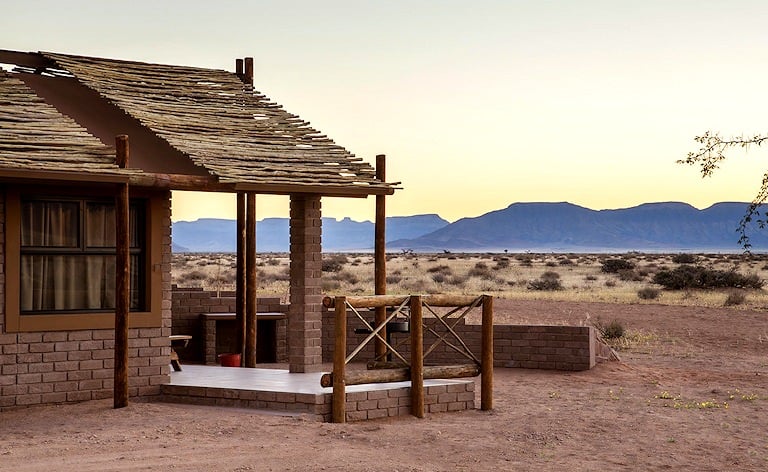
Highlights
- Scenic desert drive through Namib-Naukluft Park.
- First sight of the iconic red dunes of Sossusvlei.
- Immerse yourself in the vast landscapes of the Namib Desert.
From the tiny village of Aus, the tour heads north. To the west, the Namib-Naukluft Park provides spectacular backdrops with rocky outcrops, beautiful desertscape scenery and wide-open plains. Several stops are made en route to appreciate the scale of the world’s oldest desert and its hardy vegetation. As we approach Sossusvlei, the famous red dunes of the Namib become visible in the distance, towering above the surrounding plains and shifting subtly in color with the changing light.
Sossusvlei is a mud pan created by the Tsauchab River, which flows through the Namib only once every five to ten years before being blocked by the dunes rather than reaching the Atlantic. Even in very wet years, the river drains into the Sossusvlei basin and slowly evaporates, leaving a cracked clay pan framed by burnished dunes. ‘Sossus’ is often translated as ‘place of no return’, a nod to the encircling sands. The Namib, sometimes called the “living desert”, is a world of vast space, dramatic landscapes and jagged mountain heights, and the late afternoon is spent relaxing in this remarkable environment.
Day 6: Sossusvlei

Highlights
- Visit to photogenic Deadvlei with ancient camel thorn trees.
- Optional climb of ‘Big Daddy’ dune for panoramic views.
- Walk through Sesriem Canyon’s towering rock walls.
In the morning, we visit Deadvlei, where centuries-old petrified camel thorn trees stand in stark contrast to the surrounding red dunes and the white salt-and-clay pan of Sossusvlei. The adventurer can hike to the top of ‘Big Daddy’, one of the highest dunes in the region, offering spectacular views of the surrounding desert landscape and the mosaic of pans and dune ridges below.
In the afternoon, the tour travels to Sesriem Canyon, a unique geological feature carved over millennia by the Tsauchab River. As you descend the narrow gorge, you will be surrounded by towering rock walls that offer welcome shade and insight into the layers of sedimentary rock that record the area’s ancient past. A short nature drive follows the visit to Sesriem, where you might spot gemsbok or springbok en route to the overnight destination and gain a deeper appreciation for how rare water shapes life in this desert.
Day 7: Sossusvlei / Swakopmund
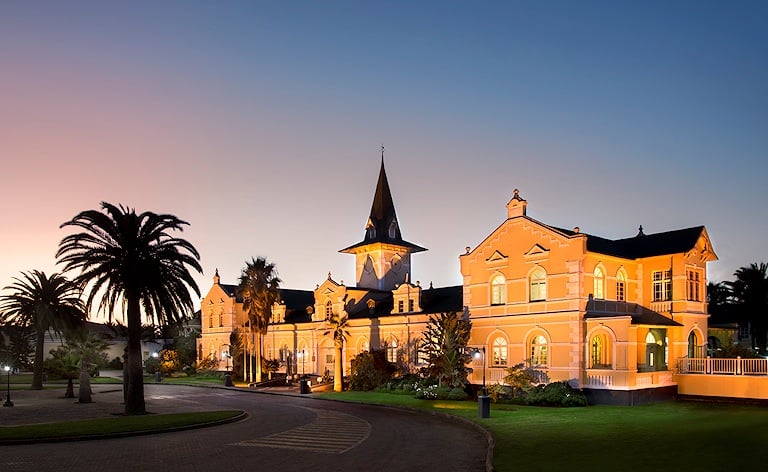
Highlights
- Drive via Kuiseb Pass with sweeping desert vistas.
- Experience the dramatic shift from desert to coastal fog belt.
- Relax in Swakopmund, Namibia’s atmospheric coastal town.
After breakfast, the tour departs Sossusvlei and travels westwards towards the coast via the Kuiseb Pass. En route, several stops are made where guests can experience sweeping views and the variety of geological formations typical of Namibia, including deeply incised canyons and stark desert plains. As we descend towards the Atlantic, temperatures cool and the landscape becomes more barren, flat and featureless, illustrating the transition from interior desert to coastal fog belt.
In mid-afternoon, we reach the village of Swakopmund, an oasis in a never-ending desert. Established in 1892, this picturesque seaside town reflects its German colonial heritage in its architecture and layout while serving today as Namibia’s main coastal resort. We travel to our overnight accommodations, where we spend the rest of the day relaxing and enjoying the cool ocean air, beachfront promenade and café culture that make Swakopmund such a popular stop between the desert and the interior.
Day 8: Swakopmund
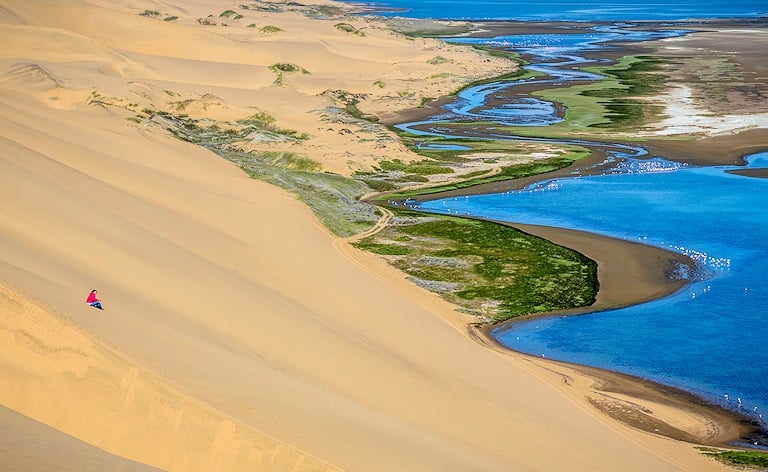
Highlights
- 4x4 adventure along the Namib dune sea and coastline.
- Visit to Sandwich Harbour, a Ramsar-protected wetland.
- Opportunities for exceptional coastal wildlife sightings.
Your excursion today is dependent on the tide and weather. From Swakopmund, we follow the coastal road to Walvis Bay, pass the salt production plant and head out into the vast Namib dune sea. Eventually, the sandy 4x4 track reaches the coast as we continue southward along the beach en route to Sandwich Harbour, about 60 km (37 miles) from Walvis Bay, where dunes plunge dramatically into the ocean.
If swells are too high, the weather is poor or the track along the coast is considered unsafe, we view Sandwich Harbour instead from the top of the surrounding high dunes. The lagoon forms part of a Ramsar Wetland of International Importance and is one of Namibia’s key coastal bird areas, with tens of thousands of shorebirds recorded in the broader Walvis Bay–Sandwich Harbour complex. Guests may take a leisurely walk around the lagoon area, where seals, dolphins and occasionally whales may also be spotted offshore, before enjoying a lunch stop and returning to Swakopmund to spend the evening at leisure.
Day 9: Swakopmund / Damaraland
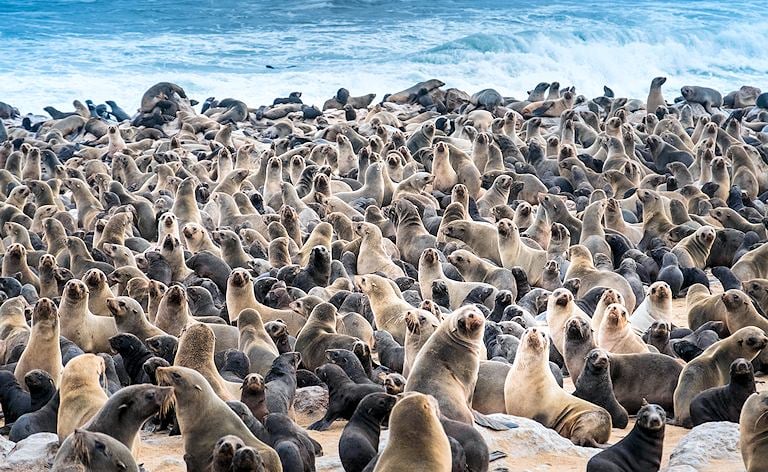
Highlights
- Travel the remote Skeleton Coast with its shipwreck-studded shores.
- Visit Cape Cross and its vast Cape fur seal colony.
- Enter the rugged, scenic landscapes of Damaraland.
After a last breakfast in Swakopmund, we say goodbye to civilization as we travel north on the coastal ‘salt road’ towards the Skeleton Coast. This northern coastal region of Namibia is one of the most remote stretches of shoreline on the planet, characterized by shipwrecks, fog and shifting dunes. While the desert landscape appears barren and almost devoid of features, the cold Benguela Current offshore is rich in nutrients and supports abundant marine life.
Our first stop en route is at Cape Cross, where Portuguese navigator Diogo Cão erected a stone cross in the 1480s during his search for a sea route to India. Today, a replica of the cross stands near one of the largest colonies of Cape fur seals on the African coast, with tens of thousands of animals crowding the rocky shoreline. After viewing the seals, the tour continues northwards along the coast before heading inland to Bergsig. As we leave the coast, vegetation becomes more noticeable, and sightings of common animals like springbok, gemsbok and kudu are possible. We reach our overnight accommodations at Palmwag in Damaraland during the late afternoon, surrounded by rugged hills and wide valleys.
Day 10: Damaraland / Etosha National Park
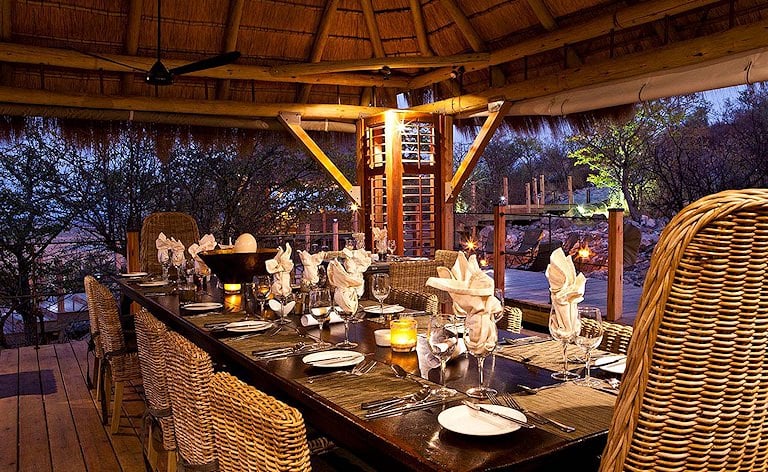
Highlights
- Journey through big-sky savanna into Etosha National Park.
- Wildlife viewing begins at Anderson’s Gate.
- Introduction to Etosha’s unique salt-pan ecosystem.
After breakfast, the tour continues eastwards through an increasingly wooded environment and big-sky country, heading towards Etosha National Park, where we enter the park at Anderson's Gate. Etosha is a place of contrast, appearing completely different after heavy summer rains, which can draw flamingos and other waterbirds to the vast salt pan when it briefly holds water. At other times, the pan forms a glaring white expanse visible from space.
During the rainy season, the dry, brittle vegetation softens to green as the animal breeding season begins and the landscape known to the Ovambo as the “place of great white spaces” briefly sheds its arid image. For most of the year, however, the park is dry, and thousands of zebra, springbok and many other species concentrate around permanent waterholes where predators lie in wait. From this point in the itinerary, game drives focus on the Okaukuejo area, which is famed for its wildlife-rich waterhole and provides excellent opportunities to observe predator–prey interactions.
Day 11-13: Etosha National Park
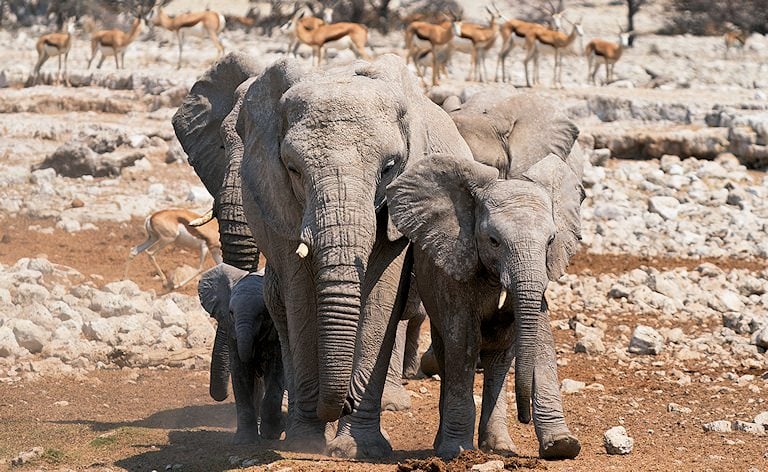
Highlights
- Extensive game drives focused on the central and western waterholes of Etosha.
- High probability of predator sightings and large herds at waterholes.
- Nighttime viewing at the iconic Okaukuejo floodlit waterhole.
Your days are devoted to game drives in the Okaukuejo region of the park. Due to the predictability of game concentrations around waterholes in the dry season, Etosha is one of the most popular parks in Southern Africa and supports a high density of predators relative to many other reserves. Lion, leopard, cheetah, spotted hyena and jackal all take advantage of the open terrain and large herds of plains game.
During the evening, guests can sit along the fence line overlooking the floodlit waterhole at Okaukuejo, one of Etosha’s signature experiences. Here, many animals – most notably black rhinos, elephants and lions – are frequently viewed as they visit the water during darkness, offering rare opportunities to observe nocturnal behavior safely. Over these three days, a combination of morning, afternoon and evening viewing maximizes photographic opportunities and provides a deeper understanding of how wildlife survives in such an arid environment.
Day 14: Departure
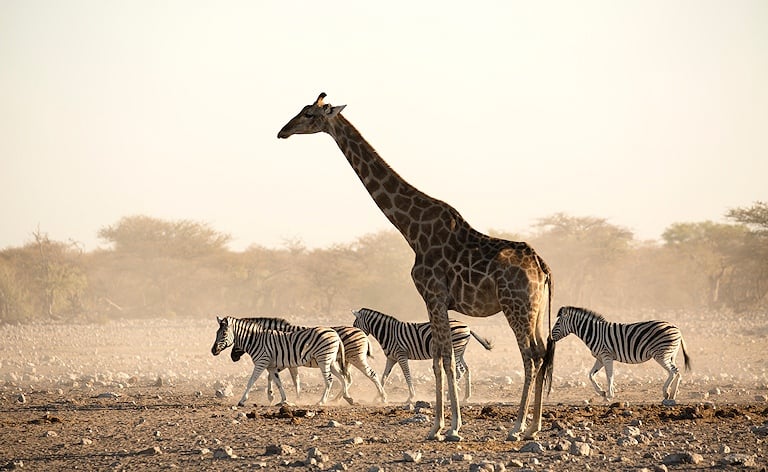
Highlights
- Final morning wildlife sightings in Etosha.
- Scenic return journey through central Namibia.
- Reflect on the diverse landscapes and experiences of your Namibia tour.
After a final morning game drive in Etosha, the safari departs south to Windhoek. The route passes a mix of communal farmland and commercial ranches, offering a last look at rural life in central Namibia before returning to the capital.
On arrival in Windhoek, guests board a regional flight to Johannesburg, bringing to an end a memorable safari tour in Namibia. The journey has linked dramatic desert landscapes, haunting coastal towns, canyon country and one of Africa’s great wildlife reserves, providing a comprehensive introduction to the country’s scenic and ecological diversity.
Included
- 1 Night Hotel Heinitzburg
- 1 Night Canyon Lodge
- 2 Nights Desert Horse Inn
- 2 Nights Desert Camp
- 2 Nights Desert Breeze Lodge
- 1 Night Palmwag Lodge
- 4 Nights Okaukuejo Camp
- Private African Sky Guide: From Day 1–14
- Private Air Conditioned Vehicle: From Day 1–14
- Only Meals Specified
- Johannesburg to Windhoek Round Trip
- African Sky Meet & Assist Service in Johannesburg (Day 1)
- All overland road transfers by private guide vehicle (Day 1–14)
- Private transfer from O.R. Tambo Airport to Johannesburg / Pretoria (Day 14)
- All Activities Included in the Itinerary, Unless Stated as Optional
- All Entrance Fees to Places Mentioned in the Itinerary, Unless Stated as Optional
- Tourism Levy
- All Applicable Taxes
- All Park Fees, Where Applicable
Excluded
- International Airfare (To and From South Africa)
- Personal and Medical Insurance
- Drinks
- Gratuities
14 Day Namibia Private Overland Tour
